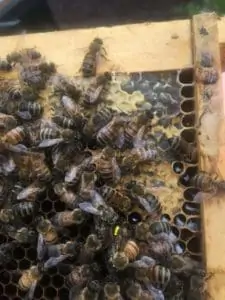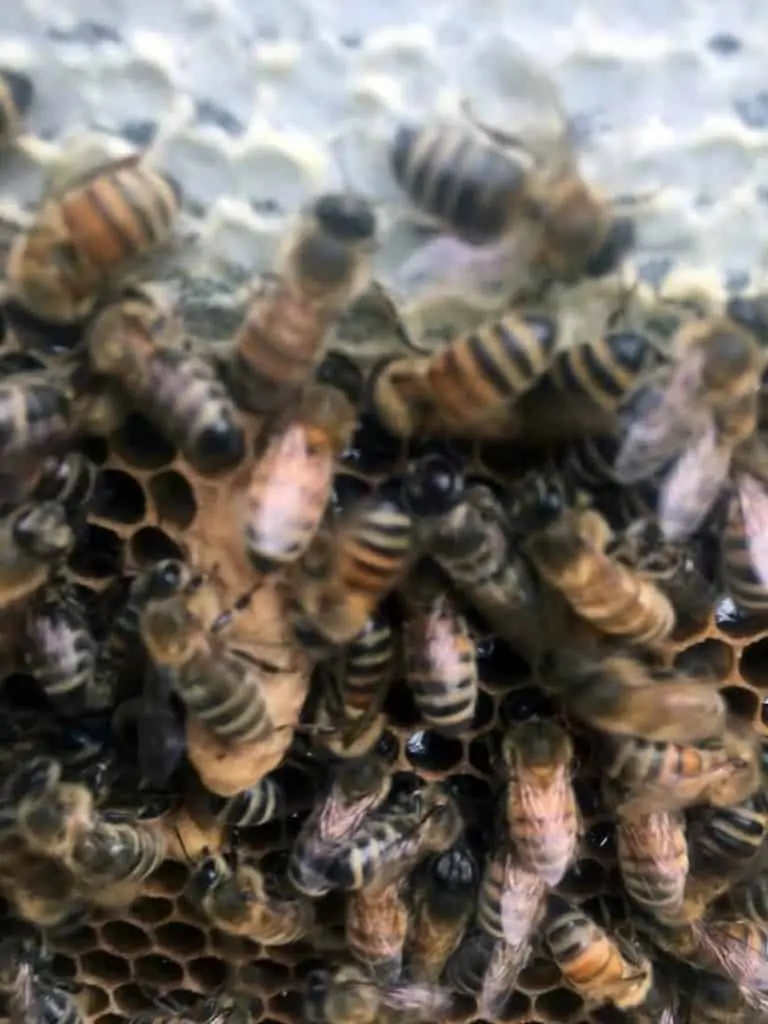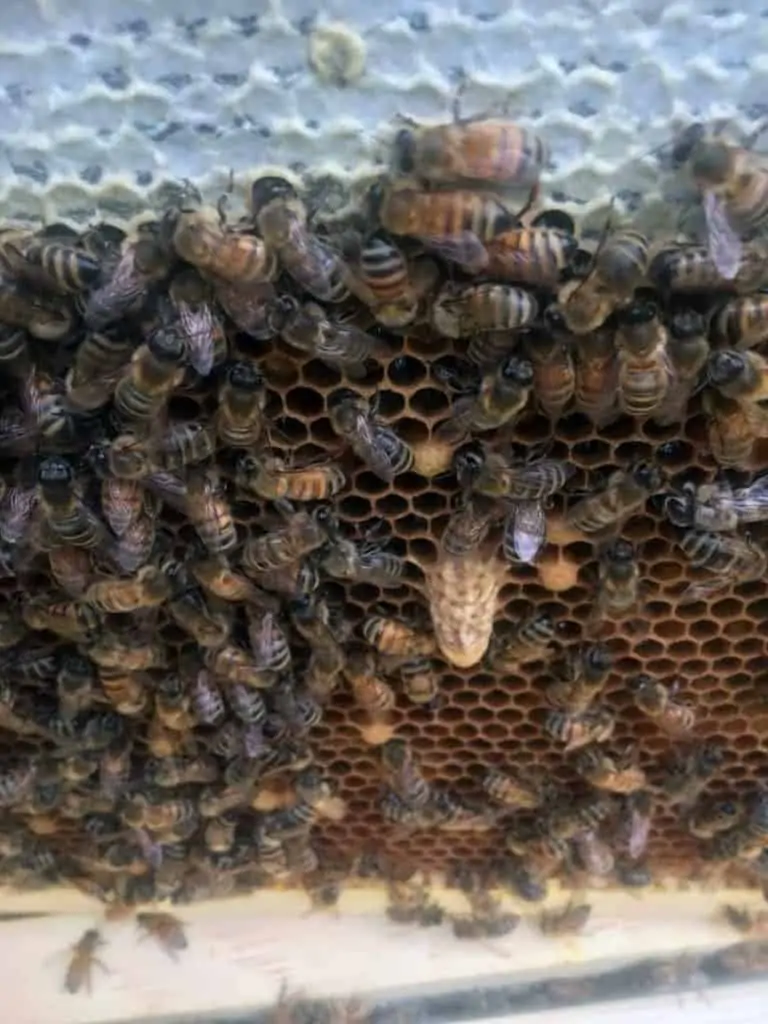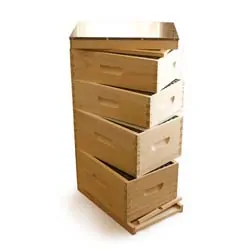Last week, we talked about hive inspections and recordkeeping. I detailed what I look for during an inspection and how I maintain my records. This week I departed home on Tuesday for an eleven day trip to Portland, Oregon, for work. Our company is hosting a few hundred of our favorite people, namely our clients, for a a four day Users Conference that began last Sunday evening.
So before my five presentations, two one-on-one sessions and two major dinners where I played host, I wanted to write a somewhat briefer blog post for the week. Unfortunately, I wasn’t able to finish it in time. Nevertheless, let’s discuss what happened in the bee yard this week.
No Formal Inspection This Week
Since I’m a few thousand miles away from my hives this week, I couldn’t perform a formal inspection. But I still have some updates from the bee yard.
On Monday, July 10th, I opened Hive Florence, Hive Acquitaine and the nucleus hive and refilled the top hive feeders. As I noted last week, Hive Florence is queenless, although three queens had emerged and a fourth emerged while I was performing the inspection. I am hoping that I return to find a queen installed in Hive Florence.
However, I decided to provide a little insurance policy in case the colony fails at producing a queen. If you remember last week, I pulled frames out of Hive Olympus to forestall a potential swarm. So, I decided to find and install a queen in this nucleus colony prior to leaving.
After some research, I learned that Paul Lott, a fellow Haywood County beekeeper, raises queens. I contacted him and he had one queen ready for sale. I brought her home and punctured the sugar cap on her queen cage and mounted her on a frame in the nuc. Before mounting her, I checked the colony for any emerged queens. Finding none, I positioned her and reinserted the frames in the nuc box.
My last task prior to departure was to check with my bee mentor, Allen Blanton, and ask if he would come check on the nuc and Hive Olympus.
My Bee Mentor Comes to the Rescue
If I haven’t said so yet, I have an exceptionally kind bee mentor for whom I have a great deal of respect. He visited my apiary on Saturday and checked on Hive Olympus and the nucleus hive. News from my apiary is mixed.
Nucleus Hive
The nucleus hive is the good news from his inspection. The bees have released the queen who apparently has set up shop quickly. She has begun laying on the nuc’s frames. So there is a newly established marked queen in the nuc which, if worst case scenario persists, I can recombine with Hive Florence when I return from my trip. Allen took the time to mark the queen so she would be easier to find.
Hive Olympus
Sad news came from this colony. My worst fears concerning the whereabouts of Hecate are true. When he opened the hive, he found four queen cups. In the supersedure position, three beautiful large capped queen cups are ready for new queens to emerge. An additional queen cup was nearing the point that it would also be capped.
The colony is raising an obviously robust replacement for Hecate. I suspect these will all emerge as Carniolan queens. It doesn’t reduce my disappointment that I’ve lost Hecate. I can only believe that I must have either crushed her or rolled her during my inspection. I am beginning to think it would be a good idea to cage the queens during my inspections to ensure that I don’t roll or crush them.
The Joys of Beekeeping
So, as I sit in the hotel room, thousands of miles away from my bees, I find that I truly miss them. They have become a part of who I am and part of my daily routine.
I miss looking out the window and seeing them awakening each morning. Or going down into the bee yard and sitting next to them watching them working and listening to the steady buzz coming from the hives. I miss getting to examine the frames and see the workings of the colonies.
In the brief period that I have been beekeeping, these busy bees have enchanted me.
I have found myself more conscious of the environment around me. And, I have noted that I am much more aware of pesticide use in my community and near my bees. I worry that some errant farmer or a gardening homeowner will go crazy with Round-up or some other pesticide and create a mass extinction of my colonies.
What’s more, I have learned to recognize the value of these hard working little creatures. The role of the honeybees and all bee species is to serve as key pollinators and especially key pollinators of our food.
Without these creatures, we would definitely experience food shortages. Until relatively recently, they have been very much unsung heroes.
In fact, until really recently, all pollinators have been very much unsung heroes. But, now we hear of bumblebees near extinction and potentially joining the endangered species list, along with many other incredibly beautiful insects not least of which includes the monarch butterfly.
So what have I done as a result of becoming a beekeeper in my own gardens?
I have become hypersensitive to the use of pesticide, so much so that I look now for organic alternatives for treating my flowers, most especially my roses. I have begun to rely more on nature and natural remedies to take care of the pests.
It can be done; it just requires a little more research to discover your options.
Time Away But . . .
During my time away from my bees, I realized that they really have become an integral part of my life. Even though I always enjoy time away from home – and especially this trip which happens annually – I found myself thinking about the bees. I found myself looking for honeybees on the flowers at the wineries I visited in Oregon as part of my hosting duties of visiting clients to our corporate headquarters.
I even tried to get my hands on some queens to bring back to enhance the local gene pool, as I know there are some queen producers on the West Coast working on raising queens with hygienic characteristics. Illness on my last day prevented me from accomplishing that task. But, it was fun to see that beekeepers and beekeeping clubs are appearing everywhere and more and more they are very active.
Now that I’m recovering from the food-borne illness and back at home, I actually have time to sit down and write the final parts of my bee musings from my two weeks away.
And lucky reader, you’ll get two blog posts this week to make up for my inability to supply you one last week. I really felt bad about not supplying a post for you last week but five presentations, two 10 person client dinners, two client lunches, a final farewell banquet, and two one-on-one hour-and-a-half long sessions kept me busy from dawn to late evening.
So, just as an aside, if you get the opportunity and have never visited Portland, Oregon, put it on your bucket list. Two weeks of weather in the 70s with no humidity and exceptional food selections everywhere was worth the time spent away from home.
You will enjoy the time spent and find a nice beautiful haven on the west coast. And did I say, Oregon has over 700 wineries and they know how to make great wine! And before any of you ask, no I haven’t been to all 700…YET!
Coming THIS Week
So, this week you will receive updates on the ongoing saga of queen replacements. I will be performing inspections on all of the hives. So get ready for updates as to what has happened over the past few weeks in my bee yard.
Until next time, happy beekeeping!




